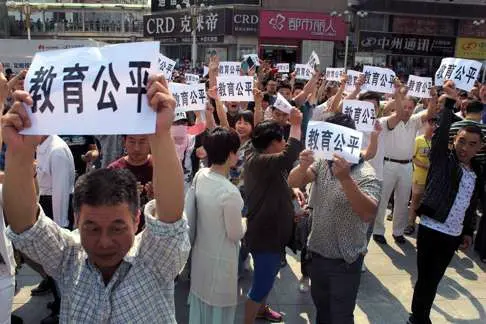Residents demonstrate in Zhengzhou over education ministry’s demand that more than a dozen provinces admit a greater number of non-local college students
Hundreds of people took to the streets in Zhengzhou, Henan province, on Sunday to protest against what they say is an unfair quota for university places.
In the latest demonstration sparked by the mainland’s tertiary education policies, protesters holding banners demanding “fair education” gathered in Erqi Square, saying there were too few places available to local students.
A demand by the Ministry of Education earlier this month that universities in 14 provinces and big cities would have to admit a greater number of non-local students prompted protests in Jiangsu and Hubei provinces.
Parents in these provinces said the plan would make it harder for local students to get a place in their home provinces due to increased competition.
Under the mainland’s education system, university places are linked to household registration, with most universities giving preference to students from within their province.
Critics say the link to household registration results in distortions in university quotas, as non-local students usually must score much higher than local applicants on entrance exams to get a place.
This puts students outside big cities, where most top universities are based, at a disadvantage. It also means students in provinces with large populations, such as Henan, are competing for relatively fewer places.
Parents in Henan say there are too few university places in their province.
The ministry says there are more than 207,000 university places in the province and that last year about 300,000 students from Henan went to universities in other provinces.
It says under the new non-local policy, a further 16,800 students from Henan will be able to study in other provinces this year.
Protesters say this is not enough, as 820,000 students from Henan have applied to sit the university entrance exam this year.
Some Henan residents issued an open letter to the State Council, calling for standardised university entrance system.
In 2013, 758,000 students in Henan vied for 85 spots at Peking University, one of the top universities in the country, while 73,000 students in Beijing competed for 226 positions, the letter says.
“While Beijing students got into universities, many Henan students who earned the same scores in their entrance exams could not even get into a college, and became migrant workers,” the letter says.
Xiong Bingqi, deputy director of the 21st Century Education Research Institute, said the protests indicated simply adjusting the quotas would not be enough to solve the problem.
He suggested breaking the link between university places and household registration.
(SOUTH CHINA MORNING POST)
 简体中文
简体中文

